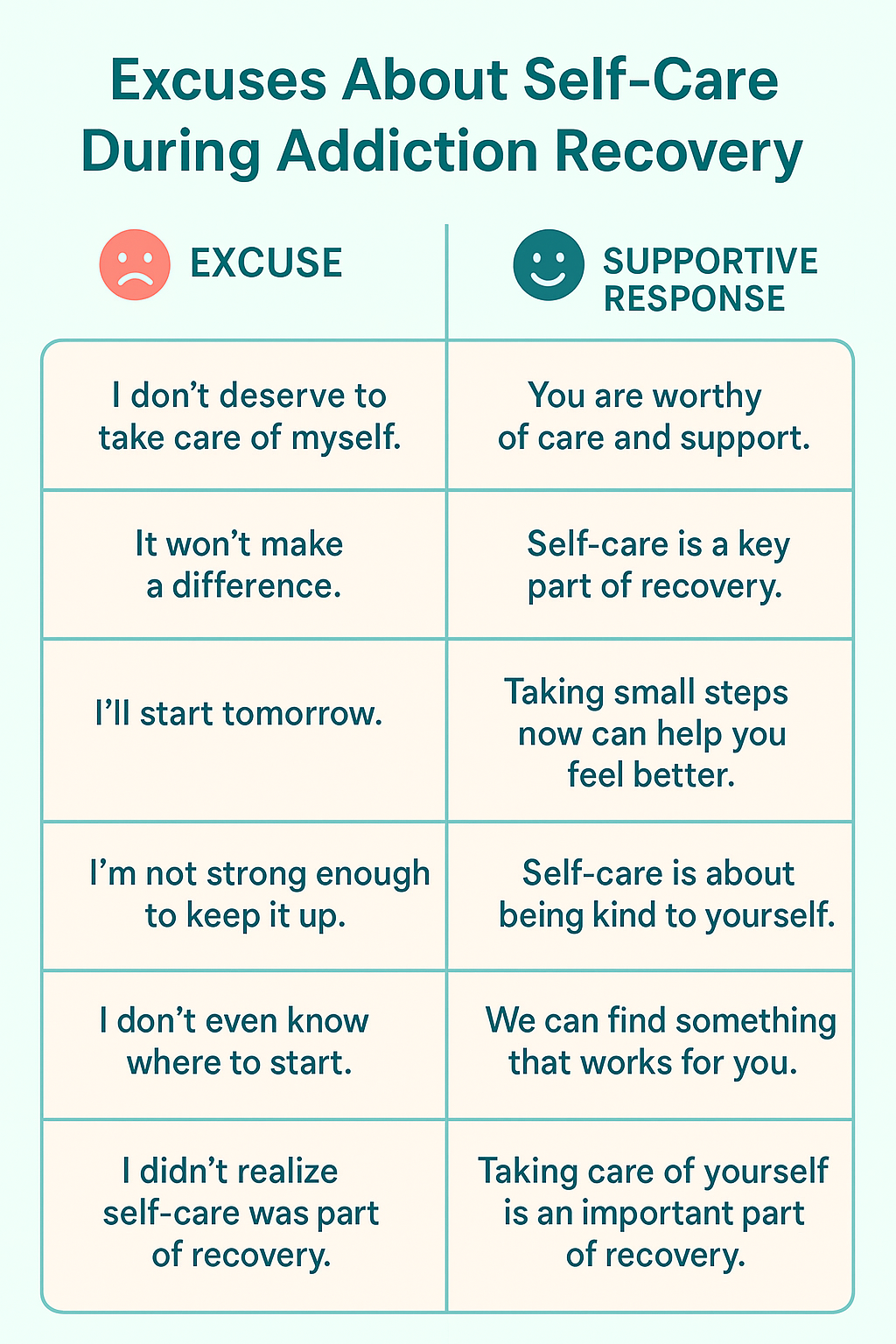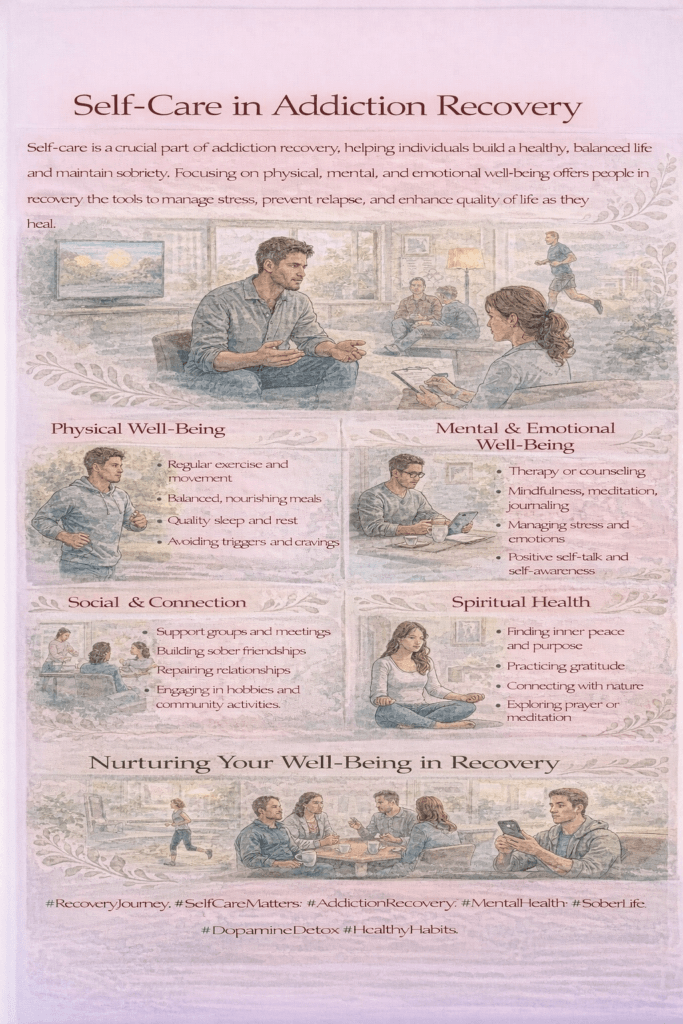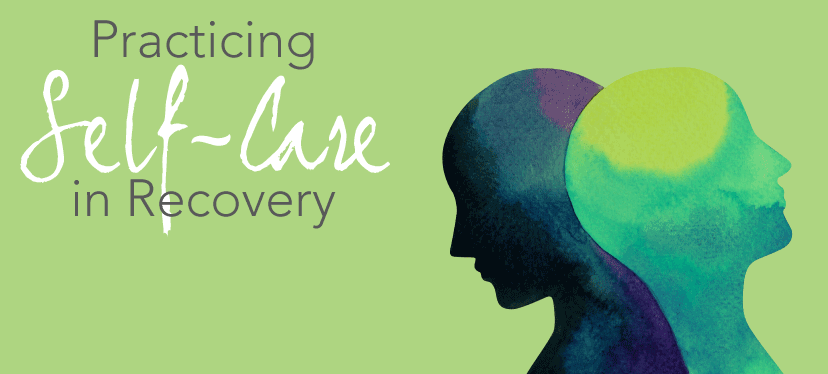Self-care is essential in addiction recovery, helping individuals heal physically and emotionally, build resilience, and maintain stability. While it supports long-term recovery, challenges like avoidance, false security, and unequal access can arise. Ethical issues include balancing autonomy with the need for support and respecting privacy. Families support recovery by modeling healthy habits and offering practical help, while community resources provide vital services and networks. Together, these elements form a strong foundation for successful recovery.
Self-Care in Addiction Recovery: Building Strength for a Healthier Future
Self-care in addiction recovery means intentionally taking steps to support your physical, emotional, mental, and spiritual well-being as you heal from substance use. It’s not just “pampering” — it’s a cornerstone of relapse prevention, resilience, and quality of life. When practiced consistently, self-care helps restore balance, manage stress, and strengthen the foundation for long-term sobriety.
🧠 1. Mental Self-Care
- Practice mindfulness, meditation, or journaling.
- Manage stress through therapy or self-reflection.
- Set boundaries with people or environments that cause strain.
- Replace self-criticism with self-compassion.
🧍 2. Physical Self-Care
- Get enough sleep and rest.
- Eat balanced, nutritious meals.
- Exercise regularly (walking, yoga, stretching).
- Attend medical appointments and follow through with care.
💬 3. Emotional Self-Care
- Talk to a therapist, sponsor, or trusted friend.
- Name and process your feelings instead of avoiding them.
- Use grounding exercises during cravings or distress.
- Celebrate small victories in recovery.
🙏 4. Spiritual Self-Care (personalized to your beliefs)
- Connect with your personal values and beliefs.
- Engage in prayer, meditation, or quiet reflection.
- Spend time in nature or peaceful spaces.
- Attend spiritual or faith-based support groups if meaningful.
👥 5. Social Self-Care
- Attend recovery meetings (AA, NA, SMART, etc.).
- Rebuild healthy, supportive relationships.
- Participate in sober social activities.
- Ask for help when you need it.
🎯 6. Recovery-Focused Self-Care
- Keep and update a relapse prevention plan.
- Track progress in a recovery journal or app.
- Avoid triggers and high-risk situations.
- Stay committed to long-term recovery goals.
Final Thought:
Recovery is not just about abstaining from substances — it’s about building a life you want to stay sober for. Self-care provides the daily tools, structure, and mindset shifts needed to protect your progress and thrive in the long run.
The Power of Self-Care in Addiction Recovery: A Path to Healing and Resilience
Self-care is essential in addiction recovery because it helps rebuild the mind and body, manage stress, prevent relapse, and support long-term healing. Addiction often damages physical health, emotional regulation, and self-worth. Through consistent self-care, individuals can restore balance, strengthen resilience, and regain control of their lives in a healthy, sustainable way.
Here’s why self-care plays such a vital role in recovery:
🧠 1. Supports Brain Healing
Recovery involves rebalancing brain chemistry and repairing pathways damaged by substance use. Activities like quality sleep, proper nutrition, and effective stress management boost brain function and emotional stability.
💪 2. Builds Resilience Against Triggers
Stress, fatigue, and emotional overwhelm are some of the most common relapse triggers. By practicing daily self-care, individuals lower stress levels and strengthen their ability to handle challenges without turning to substances.
❤️ 3. Restores Self-Worth and Identity
Addiction often leaves behind shame, guilt, and low self-esteem. Self-care sends the powerful message that a person is worthy of kindness, rest, and attention—helping rebuild a healthier self-image and renewed confidence.
🌱 4. Creates Structure and Stability
Routines around sleep, meals, hygiene, and physical activity create consistency. This structure is fundamental in early recovery when life can feel uncertain or overwhelming.
🛑 5. Reduces Risk of Relapse
When basic needs are neglected, emotional stability suffers, and cravings can intensify. A strong self-care routine acts as a protective buffer, making it easier to notice and respond to relapse warning signs before they escalate.
🙌 6. Encourages Empowerment and Independence
Recovery is about more than abstaining—it’s about building a fulfilling life without substances. Self-care helps individuals take ownership of their health and happiness, one intentional choice at a time.
Final Note:
Self-care in recovery isn’t selfish—it’s survival. By investing in their own well-being, individuals not only protect their sobriety but also create the foundation for a healthier, more meaningful life.

The Hidden Challenges of Self-Care in Addiction Recovery (and How to Overcome Them)
While self-care is a vital part of addiction recovery, it can have certain disadvantages or challenges when misunderstood, misapplied, or practiced in isolation. These aren’t reasons to avoid self-care—but it’s essential to approach it with realistic expectations, healthy boundaries, and the right support system.
⚠️ 1. Risk of Avoidance or Escapism
Some people may use self-care—such as excessive rest, distraction, or pampering—to avoid deeper emotional work, therapy, or uncomfortable but necessary conversations.
Example: Someone might spend hours meditating or doing yoga to feel “productive,” while avoiding addressing trauma in counseling.
⚠️ 2. False Sense of Security
Relying only on self-care can create the belief that outside support—such as therapy, medication, or recovery groups—is unnecessary. This can leave gaps in relapse prevention and overall recovery.
Self-care is helpful, but it’s not a substitute for a structured recovery plan.
⚠️ 3. Guilt or Pressure to “Do It Perfectly”
Some people feel guilt or shame if they can’t maintain an ideal self-care routine, especially during periods of emotional struggle or cravings.
“If I’m not journaling or eating healthy today, I’m doing recovery wrong.”
⚠️ 4. Cost and Accessibility
Certain popular self-care practices—like massages, spa days, or specialty wellness products—can be expensive or inaccessible, creating feelings of exclusion or frustration.
This can lead to feeling “left out” of what others portray as good self-care.
⚠️ 5. Overemphasis on Individual Responsibility
Focusing solely on self-care may unintentionally shift the burden of recovery entirely onto the individual, overlooking the role of community, systemic support, and external accountability.
Recovery is not just about self-will—it’s also about connection and support.
✅ Solution: Balanced Self-Care
To avoid these pitfalls, self-care in recovery should be:
- Intentional, not excessive
- Supplemented by professional and peer support
- Adaptable to individual needs and resources
- Free from perfectionism or comparison
Bottom Line:
Self-care is a powerful recovery tool—but it works best when it’s part of a balanced, connected, and well-rounded recovery plan. When done intentionally and alongside other supports, it becomes not just an act of self-kindness but a key pillar of lasting sobriety.
Ethical Dilemmas of Self-Care in Addiction Recovery
The concept of self-care in addiction recovery generally promotes autonomy, resilience, and overall well-being. However, in clinical or supportive settings, it can also raise ethical challenges—especially when boundaries, responsibilities, and outcomes must be balanced. Understanding these dilemmas helps both providers and individuals in recovery approach self-care thoughtfully and effectively.
⚖️ 1. Autonomy vs. Safety
Dilemma: Encouraging individuals to take charge of their own self-care empowers autonomy, but some may make choices that endanger their health or recovery—such as avoiding medication, skipping therapy, or engaging in risky activities.
Challenge: Determining when and how caregivers should step in without undermining personal agency.
🤝 2. Responsibility vs. Support
Dilemma: Promoting self-care can unintentionally suggest that recovery is solely the individual’s responsibility.
Challenge: This mindset risks blaming the person for relapse, while overlooking systemic, social, and environmental factors that influence recovery.
🔐 3. Confidentiality and Boundaries
Dilemma: In group or family recovery settings, deciding how much to share about personal self-care struggles or lapses can be complex.
Challenge: Balancing the right to privacy with the need for honest communication and timely intervention.
🌍 4. Equity and Access
Dilemma: Not all self-care practices are equally accessible—some require time, money, or environments that may not be available to everyone.
Challenge: Encouraging self-care in ways that are inclusive and adaptable to diverse resources and circumstances.
🪷 5. Cultural Sensitivity
Dilemma: Self-care looks different across cultures, faith traditions, and personal beliefs.
Challenge: Avoiding a one-size-fits-all approach and ensuring that recommended practices respect personal and cultural values.
🛑 6. Avoidance of Professional Care
Dilemma: Excessive focus on self-care can sometimes delay or replace necessary professional treatment.
Challenge: Recognizing when self-care is beneficial on its own versus when medical, psychological, or specialized addiction services are essential.
In summary, ethical dilemmas surrounding self-care in addiction recovery require a balanced and respectful approach. The goal is to honor personal autonomy while safeguarding health, acknowledge systemic influences, ensure cultural and economic inclusivity, and maintain clear pathways to professional care when needed.
How Families Can Promote Self-Care in Addiction Recovery
Families play a crucial role in promoting self-care to support better addiction recovery outcomes. By fostering a healthy environment, providing practical assistance, and encouraging emotional resilience, family members can make self-care a sustainable part of the recovery journey. Here’s how:
1. Model Healthy Self-Care Practices
- Demonstrate balanced habits like regular sleep, nutritious eating, stress management, and exercise.
- When family members actively practice self-care, it normalizes these behaviors and creates a supportive atmosphere.
2. Encourage Open Communication
- Create a safe, non-judgmental space for the person in recovery to express feelings, challenges, and needs.
- Listen actively, validate their experiences, and avoid pushing or pressuring.
3. Help Establish Routines
- Support the creation of daily schedules that include self-care activities such as meals, exercise, relaxation, and recovery meetings.
- Routines add stability, reduce uncertainty, and foster a sense of control.
4. Assist in Identifying Triggers and Warning Signs
- Help recognize stressors or situations that could disrupt self-care or lead to relapse.
- Encourage proactive coping strategies like mindfulness, journaling, or reaching out for support.
5. Promote Professional Support
- Encourage engagement with therapy, counseling, or medical care as part of comprehensive self-care.
- Support appointment attendance and medication adherence without being overbearing.
6. Offer Practical Help
- Assist with tasks such as preparing healthy meals, organizing transportation for meetings, and managing appointments.
- These contributions reduce daily burdens and allow more focus on recovery.
7. Encourage Social and Emotional Support
- Support participation in peer recovery groups or family therapy sessions.
- Help rebuild healthy, positive social connections that reinforce self-care habits.
8. Respect Boundaries and Autonomy
- Allow the person in recovery to take ownership of their self-care decisions.
- Avoid enabling or overly controlling behaviors that could undermine independence.
9. Celebrate Progress
- Acknowledge and celebrate small self-care successes to build motivation and confidence.
- Use positive reinforcement to encourage long-term commitment to healthy habits.
In summary, by modeling healthy routines, fostering open communication, offering practical help, and respecting personal boundaries, families can create a nurturing environment where consistent self-care becomes second nature. This strong foundation supports not only recovery but long-term wellness and resilience.
Top 10 Community Resources for Self-Care in Addiction Recovery
Self-care is a cornerstone of addiction recovery, but it often requires more than individual effort—it benefits from the support, structure, and opportunities provided by community resources. These services help meet physical, emotional, social, and practical needs, creating a stronger foundation for long-term healing.
1. Recovery Support Groups
Organizations like Alcoholics Anonymous (AA), Narcotics Anonymous (NA), SMART Recovery, and Celebrate Recovery offer peer accountability, encouragement, and social connection—key components of emotional and social self-care.
2. Counseling and Mental Health Services
Community counseling centers and nonprofit mental health agencies provide therapy, group sessions, and crisis support. These resources strengthen emotional resilience, address trauma, and teach healthy coping strategies.
3. Medical and Addiction Treatment Centers
From medical detox to medication-assisted treatment (MAT), these centers ensure that physical health and withdrawal management are prioritized—an essential part of physical self-care.
4. Wellness and Fitness Programs
Gyms, yoga studios, and recreation centers—often with free or reduced-cost options—promote physical activity, stress relief, and the creation of healthy daily habits.
5. Nutrition Assistance Programs
Food banks, community kitchens, and nutrition classes help ensure access to balanced meals, supporting physical recovery and energy levels.
6. Housing and Shelter Services
Transitional housing, sober living environments, and Housing First programs create safe, stable living situations, reducing relapse risks and enabling consistent self-care routines.
7. Educational Workshops and Life Skills Classes
Classes on topics such as stress management, budgeting, parenting, and job readiness build practical skills and confidence—essential for both mental and social well-being.
8. Peer Recovery Coaches and Navigators
These trained mentors use lived experience to guide, motivate, and connect individuals to the resources they need, offering both practical support and inspiration.
9. Spiritual or Faith-Based Groups
For those who draw strength from spirituality, faith communities, meditation centers, and faith-based recovery programs can provide deep emotional and spiritual grounding.
10. Transportation Services
Community ride programs and local government transportation initiatives remove barriers to attending treatment, support meetings, and health appointments.
In summary, by engaging with these community resources, individuals in addiction recovery can reinforce all dimensions of self-care—physical, emotional, social, and spiritual. This collective support helps build resilience, stability, and hope for lasting recovery.
Frequently Asked Questions
Here are some common questions:
Question: List examples of ethical guidelines.
Answer: Examples of ethical guidelines that can help clinicians, counselors, and support workers navigate challenges around self-care in addiction recovery:
Examples of Ethical Guidelines
- Respect for Autonomy
- Honor the individual’s right to make informed choices about their self-care, even when those choices differ from professional recommendations.
- Provide clear, understandable information to support informed decision-making.
- Non-Maleficence (Do No Harm)
- Ensure that self-care advice or interventions do not inadvertently harm the person’s recovery or overall well-being.
- Monitor for signs when self-care efforts may be insufficient or counterproductive.
- Beneficence (Promote Well-being)
- Encourage evidence-based, culturally appropriate self-care practices to support holistic recovery.
- Facilitate access to resources that enhance physical, emotional, and mental health.
- Confidentiality
- Maintain privacy regarding personal self-care struggles unless there is a clear, immediate risk to the individual or others.
- Obtain consent before sharing any information within group or family settings.
- Justice and Equity
- Advocate for fair access to self-care resources regardless of socioeconomic status, race, gender, or other factors.
- Adapt recommendations to be inclusive and accessible to diverse populations.
- Cultural Competence
- Respect cultural differences in definitions and practices of self-care.
- Tailor interventions to align with the individual’s cultural background and values.
- Collaborative Partnership
- Engage the individual as an active partner in developing self-care plans, ensuring their voice guides the process.
- Balance professional guidance with respect for personal goals and preferences.
- Avoiding Overdependence on Self-Care
- Recognize when self-care alone is inadequate and encourage appropriate use of professional treatment and support.
- Educate about the limits of self-care and the importance of comprehensive care.
- Transparency and Honesty
Set realistic expectations to prevent disillusionment or guilt.
Be honest about what self-care can and cannot achieve in addiction recovery.
Question: What excuses do people with addiction use not to use self-care to manage their recovery?
Answer: People struggling with addiction often avoid or neglect self-care for reasons that, on the surface, sound like “excuses,” but are usually rooted in deeper barriers such as fear, shame, hopelessness, or limited resources.
Here are common ones, grouped by underlying themes:
1. Emotional or Psychological Barriers
- “I don’t deserve to take care of myself.” → Often tied to guilt, shame, or low self-worth.
- “It won’t make a difference.” → Hopelessness or the belief that recovery isn’t possible.
- “I’ll start tomorrow.” → Procrastination fueled by fear of change.
- “I’m not strong enough to keep it up.” → Anticipating failure before trying.
2. Lack of Skills or Awareness
- “I don’t even know where to start.” → No prior self-care habits or guidance.
- “I didn’t realize self-care was part of recovery.” → Viewing recovery as only abstaining from substance use.
3. Time and Energy Constraints
- “I’m too busy dealing with life.” → Overwhelmed by work, family, or legal issues.
- “I don’t have the energy for that.” → Fatigue from withdrawal, depression, or daily stress.
4. Access and Resource Issues
- “I can’t afford healthy food, gym, or therapy.” → Financial limitations.
- “There’s nothing like that where I live.” → Geographic isolation from services.
5. Distrust or Resistance to Change
- “That’s not how I do things.” → Rigid thinking or resistance to new routines.
- “Self-care is selfish.” → Cultural or family beliefs that prioritize others first.
- “That’s just fluff—real recovery is about willpower.” → Minimizing the value of wellness habits.
6. Substance-Related Thinking
“If I can’t use, nothing else will make me feel better.” → Narrowed reward system in the brain.
“Using is my way of coping.” → Self-medication is seen as the only relief.
Question: Make a family-friendly chart showing these “excuses” alongside supportive responses that loved ones or providers can use to counter them compassionately.
Answer:

Conclusion
Self-care is a vital component of successful addiction recovery, promoting healing, resilience, and stability. Despite its many benefits, self-care can present challenges, including potential avoidance of deeper issues, unequal access to resources, and ethical considerations around autonomy and support. Effective recovery requires a balanced approach that includes family involvement and the use of community resources to provide emotional, practical, and social support. Together, these elements help create a comprehensive and sustainable path toward lasting recovery.
Video: Self-Care in Addiction Recovery

